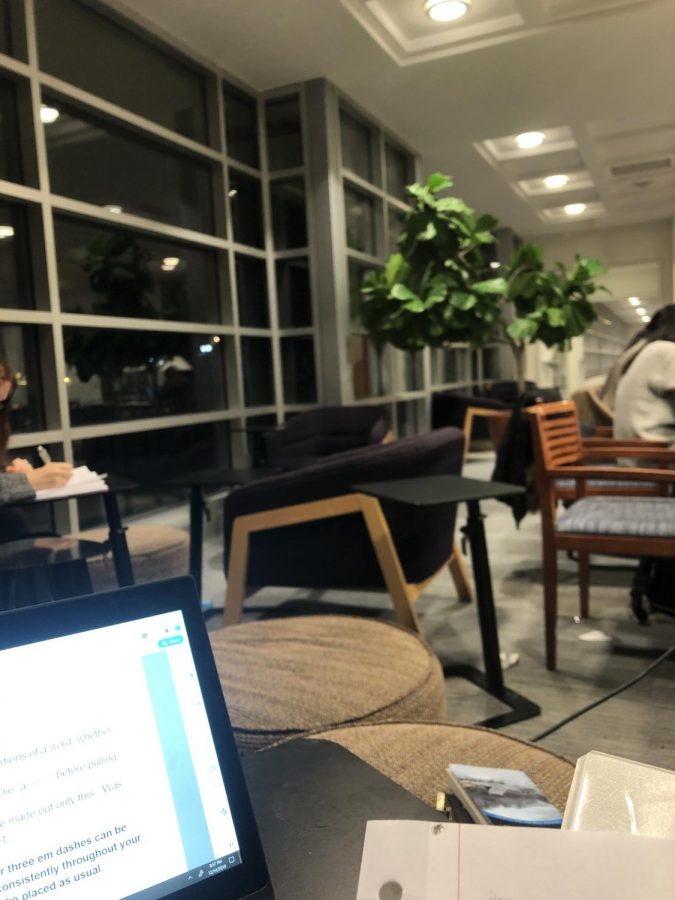How to Handle Stress during Exam Week
Students get exam-ready by studying in a library!
With the exam season right around the corner, there’s no doubt that it’s a stressful time of year for many. Following are a few tips and tricks of ways that you can stay stress-free while studying.
Know when your exams are and the way that your teacher is giving it. In the midst of COVID-19, many teachers are modifying the way that they’re doing exams. The administration, foremostly Mrs. Sudekum, communicated that many exams may be altered to the students.
“All scheduled cumulative exams that would have taken place December 16-18 on campus will take place virtually. Your teacher will communicate to you more information about this. If you are concerned that your home wi-fi will be a challenge, please let us know,” Mrs. Sudekum mentioned.
Also, if you have any questions, feel free to email your teachers and ask, but make sure that you give them ample time to respond.
In order to figure out how to handle stress, you need to learn how to recognize it. MedlinePlus defines stress as “ a feeling of emotional or physical tension. It can come from any event or thought that makes you feel frustrated, angry, or nervous. Stress is your body’s reaction to a challenge or demand. In short bursts, stress can be positive, such as when it helps you avoid danger or meet a deadline. But when stress lasts for a long time, it may harm your health.”
The first tip to live a stress-free December is to plan ahead. Create an exam study schedule. Doing this means prioritizing your exams. For example, look at your grades in each class and if your chemistry grade is hovering right around the B+/A- mark, you might want to prioritize it above the English class, you’ve got a 99% in. Also, do not procrastinate. Procrastination is a leading cause to stress in students.
The second tip is to take care of yourself. Yes, studying hard is important but relaxing and taking care of yourself is just as important. You can’t nourish your mind if your body isn’t nourished. Some things you can do are going on a walk, taking a bath, watching Netflix or doodling. All of these things are great for a brain break. Senior Taylor Polcyn actively struggles with her mental health and the exam season heightens her anxiety.
When I start to feel anxious or overwhelmed, I fall back on God. I know that no matter what happens in life, he’s always got me and is protecting me every single second of every single day. He is so wonderful,” Taylor said.
This is just one thing that works for Taylor, but everyone has a unique approach that works for them. For senior Megan Stevens, it’s focusing on school.
“For me, developing good study habits is what has helped me all throughout high school exam weeks,” Megan said.
Melissa Cohen, a licensed Clinical Social Worker and Certified Coach in New York City says that test anxiety is anxiety that usually comes before or during the taking of tests. The symptoms can be physical and mental and usually inhibit your ability to perform as well as you otherwise could. She has an extensive list of ways to manage or reduce anxiety. Some of these include:
Study as much as you can.
Try to mimic test-taking conditions.
Learn to study more effectively.
Find ways to calm down.
Watch your diet.
Get enough sleep.
Exercise regularly.
You can also find out more information at www.learnpsychology.org/student-stress-anxiety-guide/.
Very-will-mind, a self-improvement site, says that using guided imagery to reduce stress is easy and effective. Guided imagery is a stress management technique that can quickly calm your body and relax your mind at the same time. It’s not overwhelming or difficult to learn. It is known to help someone destress in minutes. To use it, you simply take deep breaths and envision yourself in the most relaxing place that is personal to you. Once you are calm, you then move to visualize what you want, this is a high score on a test or you click the submitting button on a canvas page. You can also use visualizations to prepare for presentations and score higher on tests by vividly seeing yourself performing just as you’d like to.
Additionally, the Mayo Foundation for Medical Education and Research (MFMER) states that meditation is a tactic used by many to help reduce stress in general.
On its website Mayo says: “Meditation can give you a sense of calm, peace and balance that can benefit both your emotional well-being and your overall health. And these benefits don’t end when your meditation session ends. Meditation can help carry you more calmly through your day and may help you manage symptoms of certain medical conditions.”
There are many different ways that you can use meditation, but to start, you can simply look up a video on youtube.
If you’re feeling overwhelmed or stressed feel free to call the mental health hotline at 1-800-273-TALK (8255) to reach a 24-hour crisis center, text MHA to 741741. Good luck on your exams.







